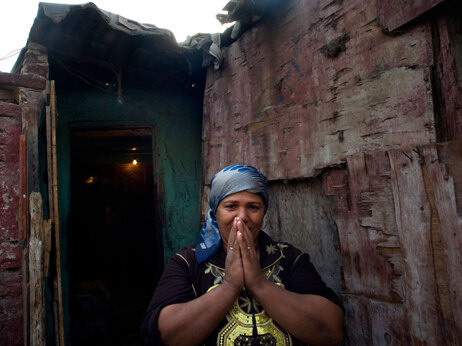 |
| by Holly Pickett for NPR |
I sometimes am frustrated with NPR's Middle East coverage outside of Palestine and Iraq, because they often seem to miss one side of whatever's going on. That's not the case with Soraya Sarhaddi Nelson's reporting on Egypt this week. It's clear that she actually lives here in Cairo, and is aware of the many competing sides of the issues here, not just the party line. She also talks about a lot of topics that are current among intellectuals and youth in Egypt these days, issues that we've spoken a lot about in CASA.
In Part I, Soraya provides a great overview of the situation in Egypt as we’ve been learning about it. I recognize in her audio slideshow a lot of places I’m familiar with and identify with the class divide she describes, including American University where I study, and Sequoia Restaurant, a posh Nile-side place with a $20 minimum charge, when many Egyptians are living on less - often much less! - than $100 a month. She also interviews Galal Amin, whose newspaper column is pretty popular among CASA professors, and who came and spoke to our program a couple months ago. I don’t always agree with his politics, but the man’s economics are sound. Soraya may say that Pres. Mubarak is making progress at liberalizing the economy, but for most Egyptians, things are getting worse.
In Part II, she talks about informal markets like Ataba Square. It’s a part of town well-known among my friends as the best place for cheap stuff. It’s a pretty desperate place, with plywood planks balanced on cardboard boxes and spread with cheap shoes, clothes and scarves, and masses of people shopping at black market prices because it’s the only way they can get by. The economy is a mess here, the formal and informal economy.
Meanwhile, you can go out to Heliopolis and the City Stars Mall, 8 floors of the best you can get in an American or European mall: H&M, Zara, Mango, Ecco, Fila, at least 5 Starbucks and another 5 Costa Coffees, TGIFridays, Chili’s, 3D movie theaters, an Apple store. I went into Levi’s yesterday to try on a pair of really hot jeans … for $110! And next door they were selling scratchy acrylic sweaters for twice that much! And the “minimum wage” she mentions? I did a report on that this week. Everyone agrees, even if you’re making twice that much, you’re struggling!
In Part III, she talks about the 3ashwa'iat, the shantytowns that ring almost every gated community and other rich neighborhood of Cairo. My professor this week said that on ‘Eid al-Adha, he and his brothers usually split the cost of sacrificing a cow, and then they donate the meat to the poor who come to their upscale neighborhood. But often those “poor” who come to the nice neighborhoods collect meat from all the clueless rich folks, then go back to the shantytowns and sell it. This year my professor’s family decided to go where the need is. He couldn’t believe, he said, that such desperate poverty existed in his own country. Unfortunately, that’s an all-too-common response.
The next day, the Center for Refugee and Migration Studies hosted speakers from the Internal Displacement Monitoring Center, which was asked by the UN to do independent research into the plight of internally displaced persons (IDPs). These are people fleeing violence, natural disaster or other similar situations, but who do not cross international borders and therefore can’t be classified as refugees under the 1952 Convention on Refugees. IDPs are about half of all displaced persons in the world, but while the numbers of refugees are falling, numbers of IDPs are rising around the world, and very little is being done by the UN or anyone else to help them. In the Q&A, someone asked if Egyptians evicted from their homes by the government as it “cleans up” desperately poor neighborhoods in Cairo are also IDPs. Though they don’t fall under the IDMC’s mandate, there is definitely some discussion about the rights of IDPs displaced by economic “development.” But as Soraya mentions, they are not recognized as such by the Egyptian powers that be.
In Part IV, she talks about Christians, women and Bedouin. Personal status laws in most Arab countries certainly favor Muslims and men, but this is actually improving a little bit in Egypt, as it is in Jordan and elsewhere, too. The Bedouin, on the other hand, are finding themselves with few champions. In fact, many have been known to say (though not on record!) that they were better off when Israel controlled the Sinai. Certainly Egypt as a whole considers itself a settle civilization, and there is some tension between those Cairene values and the nomadic values of the Sinai and Upper Egypt.
In the fifth and final report, Soraya finally gets to this week’s parliamentary “elections,” and next year’s presidential “election.” I say “election” because the outcome is no mystery at all. In fact, only approved party members are issued voting cards, and there’s good reason why Egypt consistently rejects election observers. I don’t know a single Egyptian who is intending to vote. Galal Amin, who is quoted again in this report, is known for ending all his essays and columns with the same phrase: “Democracy is the answer.” But would anyone even trust democracy if it truly came to Egypt? I don’t see that happening any time soon!
All in all, this was a very well done series, and with beautiful photos from Holly Pickett!

No comments:
Post a Comment